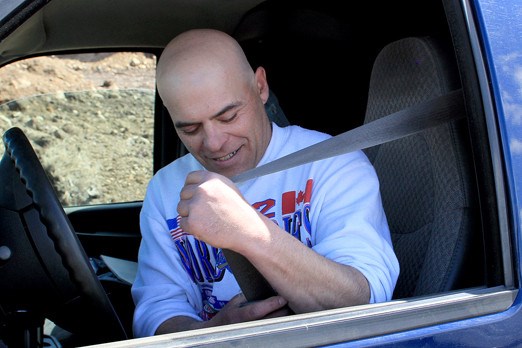Mark Covino is living proof that seatbelts save lives.
In 1994 the Thunder Bay resident was traveling home with his sister from Chapleau along the Trans Canada highway when an 18-wheeler slid across the yellow line and struck his vehicle head on.
"If we weren’t wearing out seatbelts there would have been two dead people," said Covino on Tuesday, happening upon a joint Hodder Avenue seatbelt blitz put on by both Thunder Bay Police and the OPP.
"My parents had actually just bought a (cemetery) plot for themselves and my dad said ‘we would have been burying our children’."
Covino, who walks with a limp today as a result of the crash, said he was pinned underneath the transport after the crash, then his car caught on fire. But because he buckled up, he was in one piece and was subsequently rescued by emergency personnel who arrived on scene.
"It’s very important that you wear your seatbelt. Seatbelts save lives," he said.
It’s a message Ontarians seemed to have gotten, said Thunder Bay Police Services traffic Sgt. Glenn Porter, with 92.8 per cent of all drivers in the province adhering to the law, which came into effect on Jan. 1, 1976.
Only 17.2 per cent of wore seatbelts before the law came into effect.
"It’s probably one of the most important safety devices in your car. It just increases your chances of surviving," Porter said.
On Wednesday officers were pulling over a vehicle a minute or more along the busy stretch of road, as drivers pulled on and off the Thunder Bay Expressway.
During a 20-minute stretch only one driver was nailed for not wearing a seatbelt, an infraction that also saw the man arrested and taken away on suspicion of possession of a controlled substance.
Still, not everyone is listening, especially in Northwestern Ontario.
"The figures are slightly lower in rural settings. We do have to stay vigilant and we want to keep reminding people to wear that seatbelt and stay safe," Porter said.
His OPP counterpart, Traffic Sgt David Bel, said the spring seatbelt campaign is a great opportunity for law enforcement to remind motorists that seatbelts are mandatory and the hefty fine levied on drivers and passengers not wearing one.
In addition to the $240 hit, it can also affect your insurance, Bel said.
"Your insurance company could, at some point in time, increase your rates because of the risk of not wearing your seatbelt," he said.
When caught, the most common excuse given is the person is only traveling a short distance. But that’s just as dangerous as highway driving, Bel said.
"It’s surprising that a large number of collisions occur when you are traveling 30 kilometres or less," he said. "The first thing you should do when you get into your car is put a seatbelt on. I’m sure you’re ensuring your children are wearing a seatbelt, so why aren’t you? You’re the best example for your family."
Sign in or register
- Messages
- Post a Listing
- Your Listings
- Your Profile
- Your Subscriptions
- Your Likes
- Your Business
- Support Local News
- Payment History
Registered Users
Already have an account?
New Users
Create a free account.
